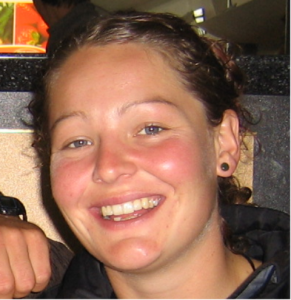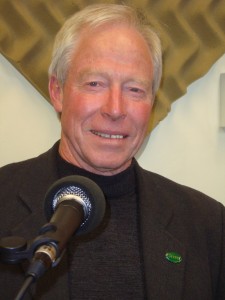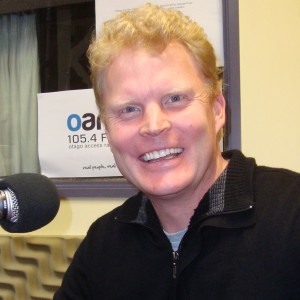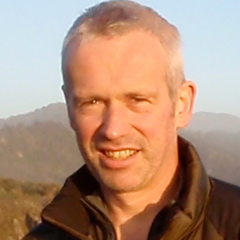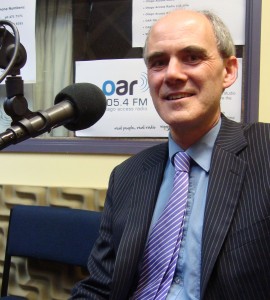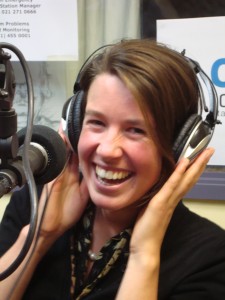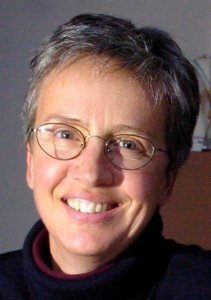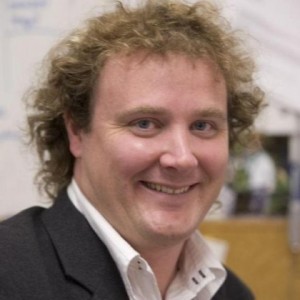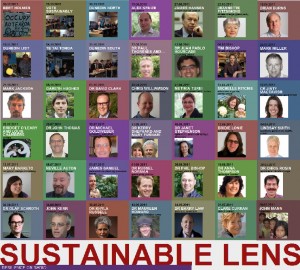Dr Gilly Leshed and Dr Maria HÃ¥kansson are from Cornell University. They are exploring the how individuals and groups accomplish tasks and socialize and the roles technology plays in these interactions. Here they talk about their backgrounds and a farm family study which is funded by Nokia through the Nokia University Cooperation Fund.
Dr Bill Tomlinson
Professor Bill Tomlinson is Director of the Social Code Group at the University of California Irvine. Author of
Greening through IT, Bill is the lead author on Collapse Informatics which recently won the CCC Sustainability Award.
Dr Niki Harré
We do this show because for us it is a flow activity. For us sustainability is about telling tales of joy. It is enriching, enhances our identities, and we get to meet awesome people. We can describe it in these terms because this week our guest is psychologist Associate Professor Niki Harré (actually the “meet awesome people” bit she would probably describe as building and affirming networks, but you get the picture). She describes the psychological basis for a positive approach to sustainability.
Associate Professor Niki Harré has taught social and community psychology at the University of Auckland for twelve years. Her recent research projects have focused on sustainable communities and schools, positive youth development and political activism.
If we were Oprah we would get everyone to read Niki Harrré’s book. “Psychology for a Better World: Strategies to Inspire Sustainability” is a must-read. You can download it (for free), but first listen to this interview. Also free. And share it with all your friends. That’s free too, and will affirm your identity in a positive way.
Shane’s number of the week: 400,000. The number of signatures required for a citizen’s initiated referendum on asset sales.
Sam’s joined-up-thinking: Over the next few weeks we’ll be hearing from international guests from the recent CHI conference. CHI is Human Computer Interaction, and the sustainability crowd at the conference have fascinating contributions.
Trainspotting: Sam’s favourite line from Niki’s lecture earlier in the week was “the scientific language of uncertainty leaves a vacuum into which our identify rushes”. His Mum (also a PhD) wrote down “tales of joy”.
Joe Davy and Martin Hyslop are first year students in Information Technology at Otago Polytechnic. They tell us how they are taking control of their own learning – with a sustainable twist.
Martin’s references:
Griffiths, M. (2010). Internet abuse and internet addiction in the workplace. Journal of Workplace   Learning, 22(7), 463-472. doi:10.1108/13665621011071127
Griffiths, M. (2003). Internet abuse in the workplace: Issues and concerns for employers and     employment counselors. Journal of Employment Counseling, 40(2), 87-96. http://search.proquest.com/docview/237019625?accountid=39660
Hsi-Peng, L., & Wang, S. (2008). The role of internet addiction in online game loyalty: An exploratory  study. Internet Research, 18(5), 499-519. doi:10.1108/10662240810912756.
Patterson, R. (1997). Can users get addicted to the internet? Canadian Medical Association.Journal,  157(6), 785-786. http://search.proquest.com/docview/204807007?accountid=39660
Shane’s number of the week: 4.4 That’s 4.4 million hectares approved for fracking in New Zealand. A recent report (Journal of Groudwater) found that local groundwater would be likely to be polluted by fracking chemicals – even in areas of so-called impermeable rock.
Sam’s joined up thinking: Sam is very proud to be introducing his students.
Ella Lawton
From pristine environments to human interactions with the environment, we take a tour of Ella Lawton‘s short career in sustainability. In a remarkably short time we go from studies in law and ecology, international law in Finland; considering footprints in Antarctica; pest control for the Regional Council; Future Leaders Programme; Sustainable Futures Trust; Project 2058; a Masters in Strategic Leadership Towards Sustainability in Karlskrona Sweden; The Natural Step and its system conditions; The Cloud Institute in New York; and starting work as a Sustainable Tourism Advisor in Regions for Otago Polytechnic. Having developed Otago Polyechnic’s Graduate Programmes in Sustainable Practice, Ella is now Project Manager for the New Zealand Footprint project and she gives us a sneak preview of the early results.
We’re left wondering what this amazing woman will achieve in the next few years.
Shane’s number of the week: 100. That’s a century of disasters described in a report from the Royal Society. The report argues that to achieve long and healthy lives for all 9 billion people expected to be living in 2050, the twin issues of population and consumption must be pushed to the top of political and economic agendas.
Sam’s joined-up-thinking: We revisit the challenge of over-development and degrowth. How we might achieve this is given a boost by the Manifesto on owning less and living more.
Trainspotting: And we play musical chairs.
Steffan Browning MP
 Steffan Browning on Sustainable Lens: resilience on radio [ 58:32 ] Play Now | Play in Popup | Download
Steffan Browning on Sustainable Lens: resilience on radio [ 58:32 ] Play Now | Play in Popup | DownloadSteffan Browning holds the agriculture portfolio for the Greens in the New Zealand parliament. He tells us of his passion and experience of running an organic greenhouse business. Local food production, he argues, is vital to constructing a more resilient society. He tells us of his experiences on the Primary Production Select Committee -asking hard questions from people who previously wouldn’t have granted him an interview.
Shane’s number of the week: 3.5. That’s a 3.5% reduction on 1990 emissions in an inventory report on net C02 from Ministry of Environment. BUT the methodology has changed – primarily how forests are counted. Net emissions have increased and are continuing to increase.
Sam’s joined-up-thinking: Prompted by the Worldwatch Institute’s State of the World 2012: Moving Toward Sustainable Prosperity, Sam talks about imagery of sustainability. The Worldwatch report describes a path to sustainability that sees green growth in developing countries matched by degrowth in overdeveloped counties.
Nicola Bould describes both design and sustainability as verbs – as processes. Design, she says is about finding creative ways to solve complex problems. Thinking bigger and wider she says is key to work at the start of the pipe – thinking in strategically and in systems – not to try to retrofit sustainability onto products at the end of the pipe. Sustainability must move beyond “can’ts” and scaring people, to looking for positives – doing the things we love in different ways. Key to this is building, and rebuilding our communities.
Nicola has just finished her PhD, and has just taken a new job as an Issues Assistant working for the Greens, based in Auckland.
Shane’s number of the week: 1.8. 1.8 billion pounds is the estimated cost to the UK of replicating the ecosystem service provided by bees (Friends of the Earth campaign).
Sam’s joined-up-thinking: Sam is off to CHI again this year where he hopes to focus on people working in areas beyond single resource consumption. He is involved in running a workshop that explores the seeming mismatch of using technology to promote more simple ways of living.
Trainspotting: Someone’s notes during during Shane’s number of the week may not have been comprehensive. They might have just said 1.8 billion. No matter, I’ll just look it up:
1.8 billion people are between the age of 10 and 24 (PSI.org)
1.8 billion people live on less than $1 a day, 70 percent of them are women (TIAW)
1.8 billion people are in informal work, and 700 million of those are in extreme poverty (formal work is 1.2 billion, OECD stats).
1.8 billion people still drinking unsafe water, UNICEF and WHO
1.8 billion young people will not reach their economic potential due to poor education, infrastructure and jobs (UN Population Fund UNFPA).
1.8 billion muslims in the world.
1.8 billion international tourists expected in 2030 (up from 1B in 2012, UNWTO)
1.8 billion US dollars worth of good shoplifted in a month in US (liveleak.com)
1.8 billion tonnes of CO2 released in Amazonian drought in 2009-10 (ERL via treehugger)
1.8 billion speakers of English (about 380 million native, wikipedia – good luck finding a valid source).
1.8 billion NOK (300M US$) being spent per year by Norway to find sustainable ways of powering the developing world
Empowering to make a difference
Linus Turner proudly describes himself as a teacher. His twitter one line bio states “Preparing children for their world …preparing their world for them …you wouldn’t want to do anything else!”.
We are the ancestors
In a packed hour we discover how Linus is teaching independence and interdependence by empowering his students to make a difference. HoD of Computing at Kavanagh College, Linus argues that the future is digital – our digital world is flat and seamless – we can contact anyone. So when his students are working on Equador’s Yasunà National Park they write to Gareth, Rafael and Helen (he uses christian names to emphasise the social connectedness, these are people too who respond to communication). This gives a reason for learning IT skills – writing to all MPs needs a database, and a brochure on a long term strategy for Dunedin trees needs desktop publishing, and so on.
Inspire hope: engender action
Linus carefully manages to run a line of empowering students, but without dumping upon them all the responsibility to fix the world: “we are the adults, it is up to us to model right thinking and action”. It’s important for kids to see progress, sometimes if the students take on something too large he has to say “Ok, we’ll take it from here, we’re the grown ups”. As adults it is our job to be creating a safe world.
Shane’s number of the week: 77. The age of the Athens retired pharmacist Dimitris Christoulas who shot himself in the Greek capital’s Syntagma Square. In a note he said the government had made it impossible for him to survive on the pension he had paid into for 35 years. “I find no other solution than a dignified end before I start searching through the trash for food,” read the note.
Sam’s joined-up-thinking: Google glasses could be the future of how we see sustainably (read on>>>).
Trainspotting: In case you’re not on first name basis: Green MP Gareth Hughes,President of Equador Rafael Correa, and UNDP chief Helen Clark.
Dr Stephen Hill
 Dr Stephen Hill on Sustainable Lens: Resilience on Radio [ 58:31 ] Play Now | Play in Popup | Download
Dr Stephen Hill on Sustainable Lens: Resilience on Radio [ 58:31 ] Play Now | Play in Popup | DownloadDespite being an engineer by training, Dr Stephen Hill argues that a sustainable future is one of better social systems, not one of technical fixes.
Within that social system Stephen explores tensions in environmental management. For example, while the history of the environmental movement stems from place based protection, the development of renewable energy is largely motivated by a drive for carbon reduction. This tension comes to a head over proposals for wind farms. While in New Zealand he has been exploring the wind farm debates, and provides insights based on comparison to developments in Canada.
We ask if there a sweet spot between science and environmental policy? and discuss trade offs, social friction, vested interests, and fundamental tensions.
While we can influence and even change behaviours through manipulating markets – carbon pricing etc (and there’s no political appetite for this), the real change comes from changing attitudes. Attitudes, though, Stephen says, change really slowly.
Stephen describes some watershed moments in his career:
- The earth shattering realisation upon reading the Brundtland report “Our Common Future” of the consquences of the population versus ecosystem services relationship.
- Going to a talk by Steven Schneieder.
- Working with Dixon Thompson – environmental management is about managing people.
Shane’s number of the week: 6. That’s six months to plug the leakage of natural gas from the Elgin well off Scotland.
Sam’s joined-up-thinking: We’ve talked about externalities before. Most of the impact of our activity isn’t internalised as a direct cost. Now KPMG has calculated how much that is – 41% of value. This means the true cost of a $100 product should be $141. This footprint relative to earnings is getting worse – rising by 50% in the eight years to 2010. It varies by sector too, for electricity; mining, marine and airlines, the unaccounted true cost is more than half the value. For food, the missing environmental cost is more than the value. In reality these costs are not borne by the companies, rather these impacts are carried by others (see full KPMG report).
Trainspotting: We apologise for leading the very optimistic Dr Hill down a line focussing on global problems. We agree – on the optimistic side, humans as a species are very adaptable.
Dr Mick Abbott
Instead of limiting the numbers of people who have access to the wilderness could we have a goal to maximise the impact – the more people the better it is?
Editor of a new book Wild Heart: The possibility of wilderness in New Zealand, Dr Mick Abbott has strong views about the wilderness. For starters, let’s lose the idea that there is such a place. Rather than defined by geography, for Mick, wilderness is any place where we can have respectful relationships with indigenous ecosystems. Thus the wilderness is a way of understanding – of generativity and richness – rather than a specific place.
From bungy jumping to brushing teeth in Antarctica, this is our widest ranging interview yet.
Shane’s number of the week: 32. That’s 32 Celsius which was the temperature in Chicago in mid March.
Sam’s joined-up-thinking: Are the Millennium Goals aspirational targets, achievable, or low hanging fruit?
Trainspotting: Extra points for answers to these ten burning questions:
- How does the experience of a bungy jump take months?
- Why should we stop treating our land as if we were all motelliers?
- Is design an indulgence?
- What can we learn from Antarctica?
- How did he come to the realisation that the more stuff I carry with me, the less I ask of the place
- Why does he support a tunnel, but not a monorail?
- Where is water explicitly energy?
- How is 100% Pure an opportunity for us?
- Why do we take photos of places and ignore the real story behind the camera?
- How many months are there until the end of the Century?
Prof Jonathan Boston
 Jonathan Boston on Sustainable Lens Resilience on Radio [ 59:49 ] Play Now | Play in Popup | Download
Jonathan Boston on Sustainable Lens Resilience on Radio [ 59:49 ] Play Now | Play in Popup | DownloadKnow your Kyoto from your Durban? How about your COP from your UNFCCC? How do burping cows come into multi-lateral agreements? In this interview Prof Jonathan Boston untangles the mysteries of global climate change negotiations. He presents an ideal model and a way forward.
Earlier in the week, Prof Boston gave a public lecture, here are some of the slides.
Trainspotting: A long interview so Shane’s number of the week, and Sam’s joined up thinking will have to wait a week.
Jinty MacTavish too
 Jinty MacTavish on Sustainable Lens: Resilience on Radio [ 59:16 ] Play Now | Play in Popup | Download
Jinty MacTavish on Sustainable Lens: Resilience on Radio [ 59:16 ] Play Now | Play in Popup | DownloadDoes being elected dull the activist? Not if you’re Dunedin’s Jinty MacTavish. She is passionate, articulate, and convincing.
It’s a year since our first show so to celebrate this double rainbow event, we’ve invited back our very first guest Jinty MacTavish. It has taken a year as Councillor, but now Jinty is excited about statements of intent for holding companies, about long term budget models and activity management plans. These things, she says, get things done. We’re sceptical but Jinty is articulate, passionate and convincing.
Shane’s number of the week: 45. That’s $45B (NZ) that BP estimates it will pay out in compensation and clean-up costs for the Deep Water Horizon oil spill. Drilling is proposed for Otago in water that is deeper and rougher. We put that scale of money in context of NZ’s annual spending on Health, Education and Social Welfare – it is just under these three major areas combined (NZ Govt functional classification 2011).
Sam’s joined-up-thinking: In memory of forester and mountaineer Don Slocum who we farewelled today, we talked about Leopold’s Land Ethic (read more>>>).
Trainspotting. We don’t mention the stadium. Doh.
Dr Nicola Mutch
Why would a successful humanitarian organisation want to sell their soul to a corporation? Why would a successful business give up their profit motive and waste time hugging tress?
Actually it turns out that the partnership in a corporate social responsibility relationship has considerable benefit for both parties. For both there is brand building, capacity building and engagement in a broader community. Dr Nicola Mutch is the Marketing and Communications Manager for Otago Polytechnic. She recently completed her PhD in the area of power relationships in corporate/non-profit partnerships. We talk about what each side hopes to get out of a partnership and how that changes as the relationship develops. She describes the potential for that relationship to go wrong – through abuse of the power relationship – and what can be done to avoid it. Perhaps surprisingly (well to me anyway) that power relationship can go both ways.
We talk about thoughtful organisations, about shared value sets, and consider what it is that gives a partnership credibility.
Sam’s joined-up-thinking: Extending a guidelines for design of a showcase building Sam thinks about the design of sustainable experiences.
Trainspotting: Anton forgets what show he is on and deviates via Mars.
Holly Walker MP
Holly Walker is a new Green MP, or perhaps it should be “an MP for the Green Party”. Â She is spokesperson for Housing, Electoral Reform, Children, Open Government, Arts Culture & Heritage, Youth & Students. Befitting these wide ranging areas we have a wide ranging discussion:
- Is it easy being green?
- Does being in parliament change being an activist?
- Who does not agree that “inequality is good for no-one”?
- Who has she enjoyed meeting from across the house?
- Why does parliament play up its combative image?
- How are future generations represented in decision making
- Will we ever get past a growth paradigm when the very idea of constraints are an anathema to many?
- Will we ever see progress on alternative progress indicators?
- How can we better engage young people in parliament?
- What could parties be doing better in social media?
- Why are we encouraged to digest the “pull yourself up” meme?
Shane’s number of the week: 51. That is 51% – we have had 51% increase in hospital admissions from infectious diseases in the past 20 years which is out of line with developed countries and one which is incidentally costing New Zealand millions of dollars a year. (more from NZ Herald).
Sam’s joined-up-thinking: “Realising value proposition” is the catchphrase of the capstone projects in Information Technology Sam runs at Otago Polytechnic. We talk about successes in the sustainable space of previous years: myGreenFeat; Arai te Uru; Housing Stars; EducatingCambodia.com; SmartAid; PestWeb; Farmwise, and eHeritage. Several new projects include citizen science; peace foundation; farm environmental accreditation, and plant identification. To these projects we can variously add smartphone, processing, participation, gamification and entrepreneurial.  Going be a busy year – will keep you posted.
Trainspotting:Â Anton describes David Clark as so old-fashioned he’s fashionable. Â Sam says the words “tear down paradise put up a parking lot”.
Dr Liz Slooten
In a show where Anton describes dolphins as “unicorns, only wetter”, our guest is Dr Liz Slooten.
Listen in to find answers to these burning questions and more:
- Why is the concept of “sustainable bycatch” for marine mammals a bit of a nonsense? (hint: we wouldn’t accept a bycatch of kiwi, yet NZ’s sea mammals are endangered and declining).
- Is a “blue economy” possible? Can the ocean withstand any further industrialisation? (hint: no).
- What is good, and bad about fisheries Quota Management System? (hint: it doesn’t specify method controls).
- Why do Hector’s Dolphin click but not whistle? (might have been other way around).
- What is New Zealand’s most polluted species? (hint: its initials are HD).
- Why can’t the dolphins learn to get out of gill nets? (hint: it is fatal).
- What is “fission fusion”? (hint: a dolphin party).
- How much would it cost to protect NZ’s remaining dolphins? (hint: a really small number).
On a more sombre note, Liz describes the recent death of a Maui’s dolphin off Cape Egmont. How it happened and what wasn’t done to protect it.
Associate Professor Liz Slooten is New Zealand’s leading authority on the use of population modelling to estimate sustainable levels of marine mammal bycatch in fishing operations. Her teaching and research interests include a wide range of scientific approaches to ensuring that intentional and unintentional impacts on animal populations are sustainable. These include visual and acoustic census techniques, study of survival and movements of identifiable individuals, study of pollutant levels in marine mammals and other animals, effects of tourism on marine mammal behaviour, reproductive biology, population modelling, risk assessment and decision analysis. Dr Slooten represents New Zealand at the Scientific Committee of the International Whaling Commission.
Shane’s number of the week: 21. Shane argues that the denial of assistive technology to green MP Mojo Mathers is a breach of Article 21 of the UN Convention on the rights of persons with disabilities. (Mojo Mather’s Maiden Speech).
Sam’s joined-up-thinking: The Resilient People: Resilient Planet reaffirms the goals of the Brundtland report. It asks what we have to do to make a difference.
Our own Dr Samuel Mann from Otago Polytechnic sat in the guest chair this week. We talked about his new book “Sustainable Lens: a visual guide“. We trace the development of sustainability through its representation in diagrams. The book presents a model for seeing the world through a sustainability-driven perspective.
Shane’s number of the week: 20 000,000,000,000. 20 trillion is the amount of money that would have to be written off the value of the oil companies worldwide if we moved to a sustainable future – which is why companies and governments are so unwilling to move in that direction…
2011 in review
Here’s our year in review. We enjoyed it immensely. Hope you did. See you in 2012.
(slightly shorter show than usual following an argument with the security alarm).
Bert Holmes
It’s not very often guests arrive for the show with a full camping kit. Bert Holmes visits the studio from his tent in the Octagon. He talks about the motivations behind the Occupy Movement, how it is changing over time, public perception, media management and night-time road works. In response to questions of long term plans he says “we’re not going to go away” but different forms of presence are on the cards.
Shane’s number of the week: 10.3% In the week The Green Party broke through 10%, Shane talks politics. We rejoice that Shane is again able to talk politics on the show.
Sam’s joined-up-thinking: What will it take for us to buy less stuff? Who will be be? Consumer Futures from Forum for the Future presents some scenarios.
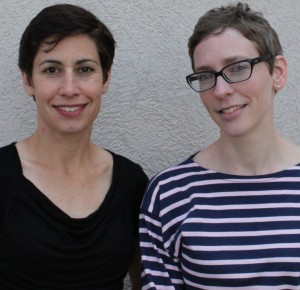


 </>
</>